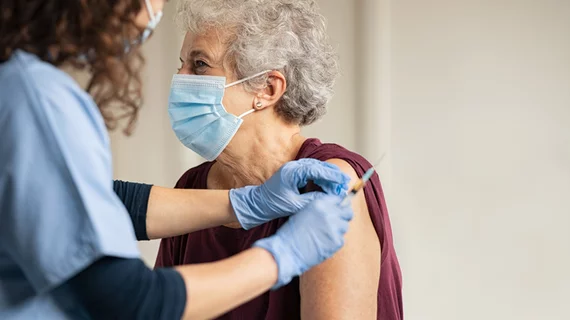Healthcare settings don’t exacerbate Covid-19 spread
Healthcare settings aren't the biggest risk factors for spreading Covid-19, according to a new study that found healthcare workers had bigger risks outside their workplaces.
The study, published in JAMA Network Open, included data from roughly 25,000 healthcare providers in three major cities––Baltimore, Atlanta and Chicago. Instead of working in a healthcare setting, the biggest risks for contracting Covid-19 came from known exposure to someone who tested positive for the virus and living in a zip code with a high positive rate. The findings were true across three cities examined. Across the healthcare systems, there was a 4.4% prevalence rate of Covid-19.
"The news is reassuring in that it shows the measures taken are working to prevent infections from spreading in healthcare facilities," study co-author Anthony Harris, MD, MPH, professor of Epidemiology & Public Health at UMSOM, said in a statement. "Vaccination for healthcare workers, however, should remain a priority because of continual exposures in the workplace. There is also an urgent need to keep healthcare providers healthy so they can care for sick patients and reduce the risk of transmitting the virus to vulnerable patients."
While the study revealed good news for healthcare workers, it did not determine how effective personal protective equipment (PPE) is in reducing risks of virus exposure. Similarly, infection control practices within healthcare workplaces weren’t specifically examined. Specifically, the study authors noted the chains of transmission were not studied.
They also did not find that certain healthcare roles, including nurses with prolonged exposure to patients, had increased risk. This means that infection control efforts are likely working.
"Factors presumed to contribute most to infection risk among healthcare providers, including caring for COVID-19 patients, were not associated with increased risk in this study," study co-author Sujan Reddy MD, an infectious disease specialist at the CDC, said in a statement. "The highest risks to healthcare workers may be from exposures in the community."
Still, the authors noted the importance of healthcare professionals to become vaccinated against the virus. Healthcare professionals are and should remain a priority group for getting vaccinated first.
Unfortunately, the study did confirm other findings that Black Americans who are healthcare professionals had higher risk, though that could be from “existing health disparities in the community,” the authors wrote. Younger professionals under 30––about 20% of the examined group––were also more likely to test positive for Covid-19 antibodies. This younger cohort was more likely to congregate in groups socially, have children in school or daycare and have contact with other young people who contracted Covid-19––all increased risk factors.

